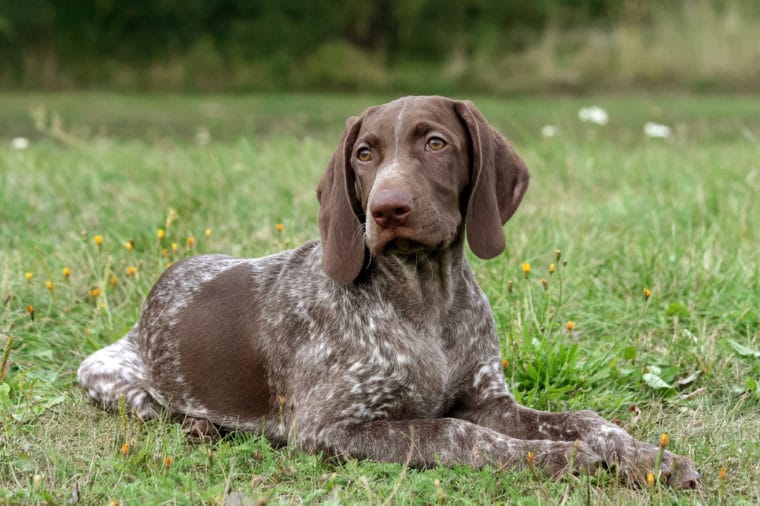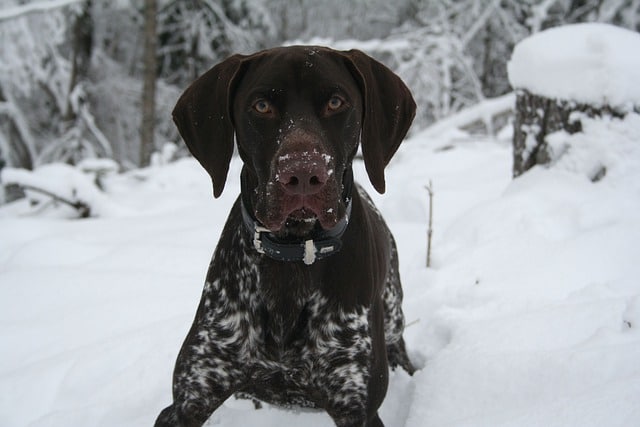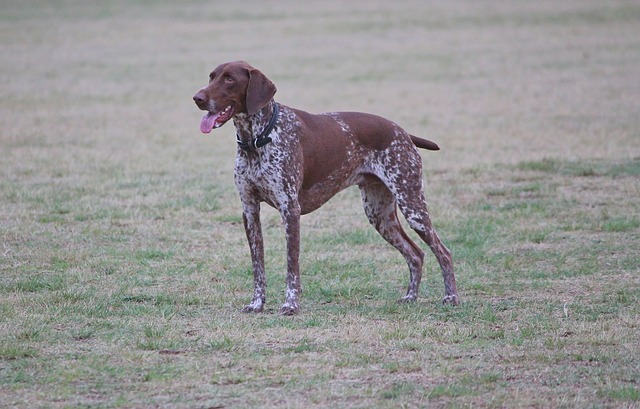Clean cut, well-proportioned, and sporty dog, the German Shorthaired Pointer (GSP) is a wonderful pet to own. It is hands down one of the most active, intelligent, and athletic pooches you will ever come across. The GSP is a perfect hunting dog that doubles up as an excellent family pet. If you can keep up with the high energy requirements, the reward will be an affectionate, playful pup for a family dog you’ll be proud to call a friend. With a handsome appearance complete with long and hanging ears, keen dark brown eyes, a medium-sized head, and a broad, long muzzle, a GSP is a true beauty.
If you are wondering whether this is a good fit for you, here’s a guide that will help you make an informed decision. We have detailed the top pros and cons of owning a German Shorthair Pointer.
Pros of owning a German Shorthaired Pointer

1. Awesome Family Pet
Intelligent, active, and happy, a GSP fits the profile of a wonderful family pet. Some of the traits that make him a good family dog include friendliness, enthusiasm, affection, playfulness, and obedience. He is friendly to both humans and other dogs if socialized early. If you especially have small kids around, they will have a time of their life playing endlessly with the dog. He isn’t afraid to form strong bonds with every last member of the family.
Although this breed doesn’t like the idea of having a stranger in your home, he will rarely cause any trouble if there’s no need to. Generally, he is not aggressive with occasional barks from time to time. Please note that some GSPs are not necessarily friendly to cats. Many are committed cat chasers.
2. Loyalty
This one is somewhat common for virtually all dogs. However, GSPs take this to a whole new level. Right from birth, this breed has two things on his mind: hunt game and show 100% loyalty to his owners. Whether you are outdoors hiking with a bunch of other people or simply walking your fur buddy round the block, he will stay by your side. As soon as you pull up on your driveway, the dog will go nuts for a while as a way of welcoming you. If anyone endangers you or any other member of the family, a GSP has no problem defending you fiercely.
3. Minimal Grooming
Compared to other breeds, a German Shorthair sheds very little. With a short coat, this is more than expected. As long as you brush him once or twice a week, you should be able to reduce the hair shed. In addition to brushing his hair, you might want to clean his ears on a weekly basis as well to prevent ear infections and trim his nails. That’s just about it with grooming—the rest is basic care. For instance, consider trimming your dog’s toenails every few weeks to prevent his nails from getting caught on his thighs and potentially tearing off. You also need to brush your dog’s teeth regularly for good oral health. Put simply, GSP is a perfect companion for people who don’t have the skill, time, and money for a high-maintenance pooch.
4. Pro Hunting Dog
A GSP is a true companion for a sportsman. Bred and developed to help their owners hunt wild game, this dog has all it takes to do just that. This is why sportsmen around the world own a German Shorthair. He is very versatile. Whether it is killing, tracking, pointing, and retrieving, this breed can do it all. As the name suggests, this dog uses his tail and body to point at pray. This perfect communication method helps hunters unearth game quite easily. Other physical features including webbed feet, floppy ears, and a square nose also play a part during the hunting sessions. Being very athletic, running for hours on end chasing prey is a breeze for a GSP.
5. Intelligence
A GSP is a very smart dog with a brilliant mind. Even without your intervention, he can perceive what is right and what is wrong. When it comes to learning, he can pick up a number of skills quite fast. Like other dogs, a young GSP may not gain control of his brain fast until he matures—at about two years of age—so you should be prepared for a few puppy monkeyshines if you decide to adopt a puppy. And because of their intelligence and curiosity, it is advisable to crate them when you are not around to prevent them from getting into mischief.
6. Adaptability
Another pro worth noting with a German Shorthair dog breed is their ease of adaptability. As long as they have enough space to move around, they can adapt to your living situation. Moving houses doesn’t seem to concern them either, provided he can see you around.
Cons of owning a German Shorthaired Pointer

1. High Exercise Requirements
This breed is high-maintenance in the way of exercise. If you are too busy to offer him plenty of activity, you are better off looking for another breed. This sometimes means running non-stop for a cool 30-45 minutes. Without enough exercise, expect the dog to develop destructive habits because of boredom. This is not one of those apartment dweller dogs. You need tons of space to let him fully thrive. If you love to exercise and have no space limitations, you will have to walk your dog in the park several times a day.
2. Constant Motion
A GSP is one of those dogs that are always on the move every waking hour of their lives. Naps are highly unlikely unless he is sick or very tired. If you don’t have a massive yard, your dog can easily get bored and jump over fences to explore the area. Fortunately, you can get away without a large yard but you will have to make up for this by offering him tons of exercise when you get the time
3. Too Jumpy
As a very energetic and active dog, a German shorthaired pointer has bursts of energy that can be quite intense. From time to time, he can be quite rowdy sending everything flying including household items and kids. This behavior is more prevalent among puppies but puppies can exhibit it from time to time. When around kids, it is always recommended to keep a close eye on the dog lest he harms them.
4. Aggressive Behavior Among Other Non-Canine Pets
German Shorthairs were developed as lone hunting dogs. As a result, they have no desire to seek companionship from other dogs. However, if they are trained properly and early enough, they can peacefully coexist with other canines. Else, they will detest dog-to-dog interactions and will get very aggressive when they meet other dogs. As for other pets, almost all GSPs view smaller non-canine pets as nothing but prey. Even with sufficient training, these breeds don’t do well around cats, rats, and other pets.
5. Training Difficulties
Another disadvantage of owning a GSP is training. Although they have the potential to learn a great deal, these breeds can be very challenging to train. For one, they are independent-minded choosing to follow their instincts rather than their training. Many of them are quite willful. During training, they easily get distracted by sounds, sights, and scents. If you are not patient and committed, consider having a professional trainer to take care of the training for you.
6. Separation Anxiety
Planning to leave your dog alone all day long as you head over to work? Not a very good idea, unless of course you have a huge fenced yard or live in a rural area with plenty of space. GSPs have been known to have major separation anxieties. When you leave them alone for long periods of time, there’s no telling what they can do to channel out their frustrations. Some have been known to jump all over the house destroying any and everything they come across. Other bored destructive include chewing through drywall and ripping sofas.
7. Health Concerns
Typically, a German Shorthair is a fairly healthy dog breed. If he gets enough exercise, eats well, and visits the vet from time to time, he should be fine health-wise for the most part. However, like any other large dog, this breed, unfortunately, has a disposition for health complications such as epilepsy, bloat, hip dysplasia, eye disease, cancer, hypothyroidism, lymphedema, and joint disease. Keep a close eye on him and don’t hesitate to report any symptom as soon as it occurs.
Quick Tips for Raising a German Shorthaired Pointer
- To ensure that your GSP grows into a well-rounded pet, early socialization is recommended. Consider taking him to busy parks and leisure strolls so that he can meet other dogs and other neighbors. This will help him polish his social skills from an early age.
- Keep your GSP’s training as interesting as possible. Any dog that is trained harshly will become stubborn and is less likely to obey your commands. Strive to keep training sessions with your GSP short and interesting. Reward and praise him for everything he does well.
- Always supervise your GSP’s interactions with children to prevent potential biting, especially when your child gets naughty and pulls the dog’s ears or tail.
- Since GSP is prone to bloat, avoid feeding your dog immediately after running or performing a vigorous exercise. Similarly, don’t allow him to run or exercise vigorously for at least an hour after eating.
- GSPs do better in warmer climates. So, their tight skin and short coats may not provide enough warmth in winter. During winter, consider buying your pup a winter coat or limiting their time outdoors.
Final Thoughts
A German Shorthaired Pointer is not a dog for everyone. Although affectionate, playful, and intelligent, this breed has special needs of his own. The bottom line is that if you can handle the exercise requirements and live in a large space, having a GSP may be a great idea for you. Else, stick to other low-maintenance breeds that can fit your lifestyle perfectly.
As an Amazon Associate, we may receive a small commission from qualifying purchases but at no extra cost to you. Learn more. Amazon and the Amazon logo are trademarks of Amazon.com, Inc, or its affiliates.

